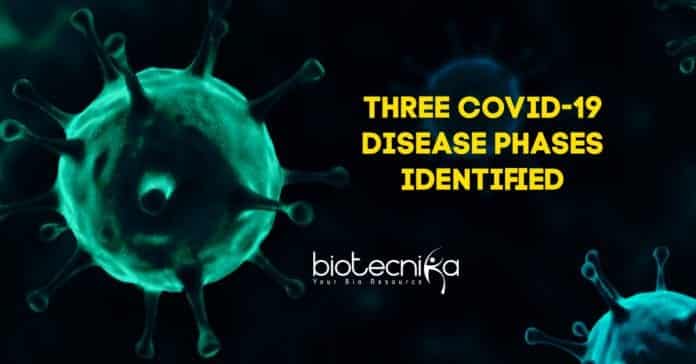3 COVID-19 Disease Phases
Researchers have defined 3 distinctive phases of COVID-19 disease development in patients, advising doctors to consider an individualized treatment strategy for individuals based upon their signs and symptoms corresponding to these infection phases.
3 distinctive phases of COVID-19 infection, with variable levels of symptoms, have been observed in people who tested positive for COVID-19, as per the researchers, including those from the University of Florence, Italy.
The review research study is published in the journal Physiological Reviews. The researchers noted that each of these stages is characterized by various types of virus’ biological in
teraction.The researchers said, SARS-CoV-2 is transmitted through droplets expelled from an infected individual’s mouth or nose when they sneeze, cough, or, in some cases, talk.
They stated the virus multiplies inside the body during the early infection phase (phase 1), and is most likely to cause mild signs and symptoms that might be confused with common flu or cold.
According to the researchers, the 2nd phase is the pulmonary phase (phase 2), when the body’s immune system becomes strongly impacted by infection, and causes primarily respiratory symptoms such as persistent cough, low oxygen levels, and shortness of breath.
The researchers noted in the study that issues with blood clotting, especially with the development of blood clots might be predominant in Phase 2.
They added, when a hyperactivated immune system may trigger injury to the organs like heart, kidneys, etc causes hyperinflammatory phase (3rd phase). In this phase, the study found that a “cytokine storm”, where the body attacks its own cells – might happen.
The researchers stated that it is critical to identify each stage in order to tailor personal therapy to people – while there might be overlap among the 3 phases.
The scientists said these experimental treatments need to be reviewed based upon the specific disease phase they are being prescribed for along with what is occurring in the body as COVID-19 advances, with a number of the medicines used to treat people with COVID-19 still being examined for safety and efficiency.
The researchers suggested a customized therapy plan in the review with a number of medications as well as possible treatments.
The researchers added, in the early phase of infection, plasma having antibodies from recovered COVID-19 patients have actually been discovered to reduce the amount of contagious viral particles.
Antiviral drugs, consisting of remdesivir, which have helped disrupt viral replication in Phase 1, might be valuable in Phase 2, as per the study authors.
The researchers included that tissue plasminogen activator (tPA) – a drug used to treat stroke – breaks up blood clots that may occur in the phase of the disease.
They also added, Inflammation-fighting drugs like corticosteroids, tocilizumab, and sarilumab might help reduce system-wide inflammation in Phases 2 and 3. Heparin – the anti-clotting drug is important during any phase of the disease to stop blood clots in capillaries and blood vessels.
But, they cautioned that there are no medications verified to treat COVID-19.
The researchers added, “We are now going into a new period of the pandemic, with numerous controlled trials targeted at identifying patient-tailored drugs, and medicines much better suited to the certain phase of the disease with improved precision”.
Author: Sruthi S































Very informative lecture and knowledgeable im very happy join with you